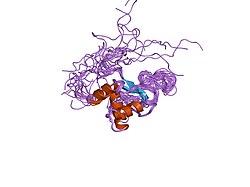Biology:PLEK2
From HandWiki
 Generic protein structure example |
Pleckstrin-2 is a protein that in humans is encoded by the PLEK2 gene.[1][2][3] The PLEK2 gene is located on chromosome 14 in Homo sapiens and is flanked by TMEM229B to its right and ATP6V1D to its left.[4]
References
- ↑ Lemmon, Mark A.; Ferguson, Kathryn M.; Abrams, Charles S. (2002). "Pleckstrin homology domains and the cytoskeleton". FEBS Letters 513 (1): 71–76. doi:10.1016/S0014-5793(01)03243-4. PMID 11911883.
- ↑ "Pleckstrin-2 selectively interacts with phosphatidylinositol 3-kinase lipid products and regulates actin organization and cell spreading". Biochem Biophys Res Commun 361 (2): 270–5. Aug 2007. doi:10.1016/j.bbrc.2007.06.132. PMID 17658464.
- ↑ "Entrez Gene: PLEK2 pleckstrin 2". https://www.ncbi.nlm.nih.gov/sites/entrez?Db=gene&Cmd=ShowDetailView&TermToSearch=26499.
- ↑ "AceView: PLEK2 gene". AceView. National Library of Medicine. https://www.ncbi.nlm.nih.gov/IEB/Research/Acembly/av.cgi?db=human&term=PLEK2&submit=Go.
Further reading
- "PI3K regulates pleckstrin-2 in T-cell cytoskeletal reorganization.". Blood 109 (3): 1147–55. 2007. doi:10.1182/blood-2006-02-001339. PMID 17008542.
- "Cloning, expression and chromosomal assignment of human pleckstrin 2.". Mol. Biol. Rep. 32 (1): 35–40. 2005. doi:10.1007/s11033-004-4747-x. PMID 15865208.
- "The status, quality, and expansion of the NIH full-length cDNA project: the Mammalian Gene Collection (MGC).". Genome Res. 14 (10B): 2121–7. 2004. doi:10.1101/gr.2596504. PMID 15489334.
- "Generation and initial analysis of more than 15,000 full-length human and mouse cDNA sequences.". Proc. Natl. Acad. Sci. U.S.A. 99 (26): 16899–903. 2003. doi:10.1073/pnas.242603899. PMID 12477932. Bibcode: 2002PNAS...9916899M.
- "Cloning and expression of pleckstrin 2, a novel member of the pleckstrin family.". Biochem. Biophys. Res. Commun. 265 (1): 87–93. 1999. doi:10.1006/bbrc.1999.1461. PMID 10548495.
- "Pleckstrin 2, a widely expressed paralog of pleckstrin involved in actin rearrangement.". J. Biol. Chem. 274 (31): 21515–8. 1999. doi:10.1074/jbc.274.31.21515. PMID 10419454.
- "Generation and analysis of 280,000 human expressed sequence tags.". Genome Res. 6 (9): 807–28. 1997. doi:10.1101/gr.6.9.807. PMID 8889549.


